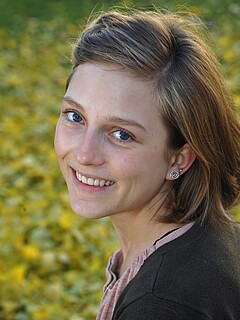PhD students 1st cohort

Dr. Patricia Kleßen (geb. Kotzauer)
Curriculum Vitae
Patricia Klessen (born Kotzauer, 1989) completed her Bachelor from 2008 to 2012 with a major in German studies and history. From 2012 to 2015 she completed her Master of Modern History at FSU Jena. During her studies she was employed as an assistant to the chair of gender history and in the DFG network ‘Material Culture and Consumption in Europe of the Early Modern Period’. Patricia Kotzauer was also employed from 2013 to 2015 as part of the visitor support team at Schiller’s house in Rudolstadt where she led tours and carried out archive research. She has been a PhD student at the ‘Romanticism as a Model’ research training group since October 2015.
PhD project (finished)
Duke Augustus of Saxe-Gotha-Altenburg and the Queer Potential of an Aristocratic-Romantic Life
“Because I am a plant, a vessel, an aprasa that no one has ever defined because no-one has ever looked upon it with the eyes of impartiality. Firstly because I sat not still and secondly because these lenses had not as yet been cut. So I beg you to consider me as that which my speech describes.”
The preceding is an excerpt from a letter from the Duke Augustus of Saxe-Gotha-Altenburg (1722-1822) that is exemplary for the ambivalent portrayals of his persona. My work will explore these creations of self, their motifs and strategies taking into account at least two research interests.On one hand, the self-stylization of the Duke and its link to the strategies of romantic forms of subjectivization will be examined. These forms have already been addressed in broad and diverse analyses in Literary Studies and Sociological research.
On the other hand, this research will explore to which extent the situational, revolutionary and contradictory identities, which were characteristic of the early Romantic current around 1800, contain queer potential and thus, at the brink of Modernism, giving impetus for postmodern subjectivization forms.
These abstract and theoretical questions will be discussed using the analysis of historical sources with the life of Duke August as an example. Not only will his verbal self-portrayals as shown in his letters be under investigation but also his material interests which are documented by the purchase orders made to his purchaser. Following Colin Campell’s Theory of romantic ethic and the spirit of modern consumerism Duke Augustus’ consumerism can be seen as a possible expression of the Romantic Zeitgeist. The research intends to demonstrate that the aristocrat’s life, his self-portrayal, and the manner in which he interacted with other people can be seen as the first level of actualization from the conceptual model of the research training group “Romanticism as A Model”.
These considerations preceding, a condensed biography of the protagonist and an outline of his social network at the beginning of this research will serve to supplement the somewhat sparse state of research into the character of the duke. Consequently, Gender Studies, research in Romanticism and research in German nobility form the central tenets of my research. These ensure that Duke Augustus’ means of romantically adapting to the world are considered against the background and histories of an aristocratic living environment.
Publications
Aufsätze
Texte keiner Autorin – Rahel Varnhagen und der Brief als literarische Form, in: Kunst, Spektakel, Revolution 4 (2014), S. 29-38.
Queer Things? Sammellust und Selbstinszenierung bei August dem Glücklichen (1772-1822), in: Anne Conrad u.a. (Hg.): Frauen – Männer – Queer. Ansätze und Perspektiven aus der historischen Genderforschung, Sankt Ingbert 2015, S. 177-189.
„Ich schließe dich an mein Herz“. Familienleben im Briefwechsel, in: Helmut Hühn/Ariane Ludwig/Sven Schlotter (Hg.): „Ich bin im Gebiet der Poesie sehr freiheitsliebend“. Bausteine für eine intellektuelle Biographie Charlotte von Schillers, Jena 2015, S. 53-60.
Dinge als ›Zauberspiegel‹. Die materielle Selbstmodellierung des Herzogs August von Sachsen-Gotha-Altenburg (1772–1822), in: Annette Caroline Cremer, Martin Mulsow (Hg.): Objekte als Quellen der historischen Kulturwissenschaften. Stand und Perspektiven der Forschung, Köln (u.a.) 2017, S. 183-194. (= Ding, Materialität, Geschichte; 2).
Kleinere Beträge
(Zs. mit Hendrick Heimböckel): Rezension zu: Norman Kasper/Jochen Strobel (Hg.): Praxis und Diskurs der Romantik 1800-1900. Paderborn 2016, in: Blog Modell Romantik, 26.04.2017
Presentations
- Zum Nutzen von Queer Theory und Material Studies für die Geschlechtergeschichte der Frühen Neuzeit [Tagung „Wie weiter mit der Geschlechtergeschichte?“, Saarbrücken, 31. Januar – 2. Februar 2014].
- Herzog August von Sachsen-Gotha-Altenburg aus intersektionaler Perspektive [Tagung des Arbeitskreises Biografie und Geschlecht, Hamburg, 17.-18. April 2015]
- „Der Zauberspiegel für eine männliche Armide“. Zum Konsum von Ambiguität bei Herzog August von Sachsen-Gotha-Altenburg (1772-1822) [Materialität(en) – 21. Fachtagung des Arbeitskreises Geschlechtergeschichte der Frühen Neuzeit, Stuttgart, 29.-31. Oktober 2015]